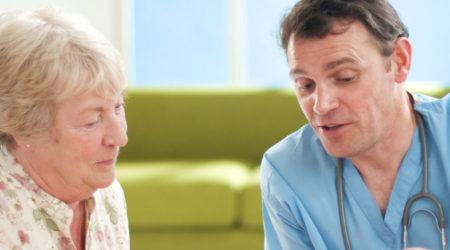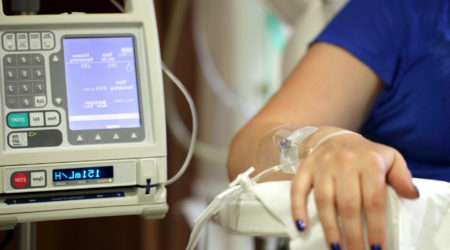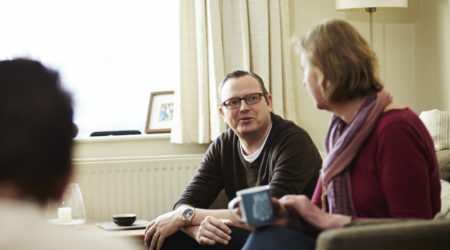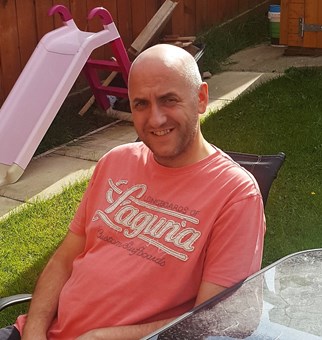

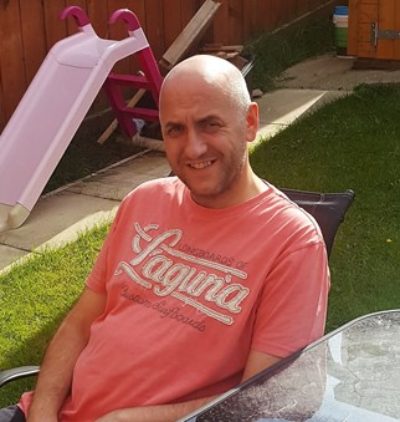

Dean
Dean, 41, was diagnosed with an ampullary carcinoma. He had the Whipple's procedure and chemotherapy.
Dean updated his story in July 2019.
My journey began like a few others I’ve read whilst trying to find glimmers of hope from other people’s experiences, with the yellowing of my eyes and then, more noticeably, my skin. I’d had blood tests done in March of this year as part of a medical check up one gets when reaching 40. They contacted me a short time later to say that my liver was ‘borderline’ and that they would like to test me again in a few months. No worries, I thought.
Then, on the 31st of May, they rang to confirm I’d be available to go in for another blood test at the end of June. I was at work at the time, but managed to mention that, while I had them on the phone, my eyes had gone yellow and that colleagues had commented that I didn’t look well at all. I should add here that I felt fine. The voice on the end of the phone changed from efficient and grey to very efficient but tinged with urgency. She said to come in straight away as she was booking me an emergency appointment with my GP. My GP noted that I’d lost 12 kilos in nearly 3 months – I wasn’t dieting or exercising. I hadn’t even noticed the weight loss. I was admitted that night. From that point onwards has been a blur and flurry of appointments and hospital stays.
Diagnosis and planning my treatment
Ultrasound scan, CT scan, MRI scan, ERCP (endoscopy used to install a stent), a second endoscopy to take a biopsy, endless blood tests all ended up with the initial diagnosis of bile duct cancer, which was later clarified/changed to be ampullary cancer. Read about tests for pancreatic cancer.
I was transferred from the wonderful care of my local hospital to a more specialist hospital. It was here that I met the quirky, yet clearly brilliant, Professor who sat myself and my wife down for a conversation that really brought the realities of what was going on and what a Whipple procedure entails. We had both tried (without success) to avoid reading too much on the internet because it was all very dire in terms of life expectancy greater than 5 years. We latched on to the positives we thought we heard, but in reality were probably of our own making. It really was a very sobering chat. Don’t (like we did) expect any definitive answers or to be told that this will fix you. It was exactly what we needed. A no nonsense overview of my predicament. It added clarity to my situation and to just take each step as it comes.
My operation
On the 28th of July I went into hospital at 7am with my wife and Dad. I wasn’t worried or scared. I had immense confidence in the Professor and his team. I was, however, deeply concerned about leaving my wife and Dad to sit worrying for 6 or 7 hours. It’s strange, but being the one with cancer seemed easier to handle for me than to be the helpless partner/relative left to stress for hours on end. It wasn’t long before everything was explained and off I went. The epidural was first – not pleasant but if you’re reading this heading towards a Whipple procedure, you’ll be glad of it afterwards. Then came the sleepy-time drugs and then I was gone. I have a vague memory of being shaved, but that’s it, thankfully.
I was actually on the operating table for 9 hours, but away from my wife for 12. The procedure went really well I was told when I awoke, then passed out again. This happened for a number of hours – drifting in and out of sleep. The most amazing rush of emotions came over me when I saw my wife smiling at me. “Hello.” I managed to drunkly say. Then I passed out again.
Recovering from surgery
Nothing prepares you for the shock of waking up attached to so many differing tubes. This is also something to later use as a check box for getting better. As each one comes out, the relief is tremendous and you know you’re making progress. 23 hours after arriving in intensive care I was moved to a ward. Within hours of waking up on the ward I was persuaded to get up and into my chair. It was incredibly uncomfortable and a nightmare to negotiate with all the drains and tubes I was still attached to, but I trusted the nurses and physiotherapist when they said it was the best thing to do to aid recovery. I kept this in mind every day and tried to do as much as possible to get up and move, even if it was, initially, only a few steps. Once the tubes and drains began to slowly disappear over the next few days, there was no stopping me. It hurt getting up, but it hurt less every time I did.
A big step for me was putting my pyjamas on and getting rid of that bottom flashing attire they insist you wear. You will lose any concerns about baring one’s rear after a couple of days. From then on I knew I was heading closer to going home. At day 7 I was told I could go home once they had removed my two drains (a very surreal experience), but they changed their mind after consulting the boss (the Professor), who said I needed to stay in for 24 hours after drain removal. Day 8, I was free!
Continuing my recovery at home
Being home feels great. It’s now 19 days after my operation and I’m getting more mobile by the day. I have only just managed to lie on my side when sleeping, which is bliss. My wound is healing really well and should make for an impressive conversation starter. Mine is in the shape of a Mercedes-Benz badge without the outer ring. Walking is also getting much easier and I’m adding distance each time. Sleeping has been an issue as you naturally want to turn in your sleep, but can’t and lying on one’s back is often the only option, and I often need a nap on an afternoon.
Eating is something that will differ from person to person; my own has been better suited to small and often, and remembering to take the Creon tablets helps. Be prepared for the arrival of mega-farts. Find a position that, erm…assists in the process and revel in your glorious guffs. It sounds disgusting, but felt like a tremendous release of pressure and I’m sure dissipated my swollen tummy.
Looking to the future
The overall consensus, after chatting with my surgeon, is that they got all of the cancer. The lymph node tests came back with 3 out of 19 showing cancer, so chemo is a must to mop any lurking nasties that escaped the scalpel.
I must thank all of those nurses who cared for me (especially those who came to my rescue in the middle of the night when the painkillers wore off), the surgeons who operated on me, the lovely gentlemen on the ward who were in equally painful predicaments, but kept my spirits up with great craic, the lovely people at MacMillan and lastly, but by no means least, my incredible wife, who is truly heroic and with whom I have fallen further in love.
August 2017
Update October 2018
It’s been quite a while since my operation, more than 10 months, and the further I get from it, the further I want to get from it. You see, that means I’m still here, which means I’m still alive and cancer free. That’s how I look at things now; everything is a step towards some future point where I can begin to put this all behind me, or at least put it to one side. I’m beginning to get used to having the spectre of cancer lurking in the corner of every room and seeping into my thoughts at some point during the day. It’s usually fleeting and they are becoming less often and less melancholy as I feel more like myself, fitter and more able.
All of this has come after chemotherapy. I had a brief interlude between the operation and chemotherapy commencing where I was really feeling gains in my overall well-being. Nothing remarkable, just progress. It almost feels, in hindsight, like my healing and progress was put on hold during my chemo treatment and that I’m back on track now it’s over.
My schedule began in early October and I was prescribed gemcitabine once a week via a drip and, as I’d agreed to be part of a trial, capecitabine tablets orally twice a day. I was very nervous about my first infusion of gemcitabine; I’d heard about all the side effects of any cancer drug and I was preparing myself for a hellish time afterwards. As it turned out, I felt very little from that first one, aside from lethargy and two or three days of haziness.
Update July 2019
This month I celebrated 2 years since my Whipple’s procedure. We celebrated in the way I like more than anything, with normality; we watched TV and had a few beers.
I am not receiving any treatments or taking any pills. Diabetes hasn’t happened and I have managed to put weight back on relatively easily (really easily!). Physically, I am probably better than I have been for many years. I think I may have been unwell or feeling ill for many years before I noted it.
I left my job as a teacher 3 months before stepping on the cancer roller-coaster. My GP had suspected stress the previous year, so (with pressures from my doctor, wife and family) I left and took a job elsewhere. The symptoms cost me a job I loved. This was one of the saddest and tragic side effects; but it gave me a goal.
The good news is that I have returned to teaching English in a secondary school 4 weeks ago. They literally took my hand off when I applied. So, I’ve worked 4 weeks and am currently sitting watching box-sets as it’s the summer holidays!
I still get the odd and infrequent Whipple attack, and ironically I got one on my 2 year Whippleversary. They happen less and less often and don’t seem to last as long as they used to.
I have now written numerous poems borne from my experiences of the last couple of years, and I occasionally share them. One of them was published in the Durham University Poetry Society Journal – The Gentian. Not a massive achievement, but I felt a smidgen of pride. It was to my daughter, Lily.


